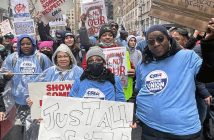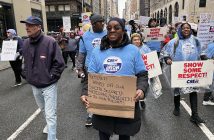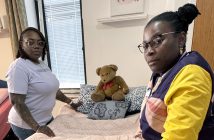
Rosa
BRONX — On Inauguration Day, Evelyn Rosa heard the sound of glass shattering and it wasn’t on the pavement of her beloved New York City.
For Rosa, an office assistant at the state Division of Parole and member of the CSEA Special Committee on Minority Issues, that glass was coming from the multiple glass ceilings that were being broken by the election of Kamala Harris, the nation’s first Black, South Asian and Caribbean woman and daughter of immigrants, as the nation’s Vice President.
“For a Puerto Rican woman like me who lives in the Bronx to see another Puerto Rican from the Bronx, U.S. Supreme Court Justice Sonia Sotomayor swear in Vice President Kamala Harris is such a big deal,” Rosa said. “We now can believe that we can get to the same place and be equal because we have some representation.”
With Black History Month just days away, the occasion marked a prescient kick-off for a month highlighting the culture, history and vast contributions made by African Americans. As a member of CSEA’s Special Committee on Minority Issues, Rosa said it’s a moment to reflect, but also to continue pushing forward.
“In order for you to believe that you can do something, you have to see it,” said Rosa. “With the election of Vice President Harris, we can see it. It’s not only about hope and faith.”
As a second-generation CSEA member, (her mother worked for Parole and Corrections), Rosa also recognized that while it’s important for people of color to have role models in high places, it’s equally important for historically underrepresented groups to gain access to stable, good paying, union-represented civil service jobs.
“There are a lot of people who are essential workers and they don’t have good health care,” said Rosa. “They also can’t take days off because they need to support their families.”
It’s one reason why Black and Brown communities are suffering disproportionately from the pandemic. As a union, Rosa said, we need to do more to show the community what we do so they can support our efforts and recognize the need to join a union themselves.
“It’s important for us to get involved,” said Rosa. “We speak to our members, but we don’t speak to the community. We need to let them see themselves in our work and mission.”
Rosa, who serves as vice president of the CSEA Division of Parole, credits CSEA President Mary E. Sullivan for providing her with many of the leadership tools and the knowledge she obtained through the union’s Leadership Education and Development (LEAD) Program. She also sang the praises of her Local President, Barbara Felder, who is a leader in her community as well as our union.
While the pandemic has hampered the ability to coordinate programs in person, Rosa said she is working with others on her committee and regional activists to program several virtual events including one for Black History Month.
“I really want us to get a to place where we are really equal,” Rosa said.
— David Galarza



